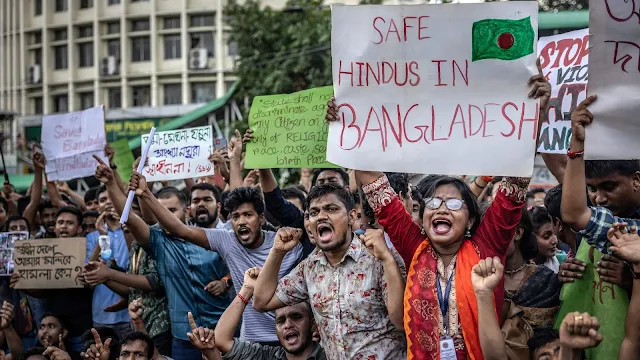Hindu protests erupt in Bangladesh amidst political turmoil, Yunus seeks amicable relations with India
Recent public demonstrations in Dhaka and Chittagong have challenged the commonly held perception that Hindus and other religious minorities in Bangladesh are always subjected to persecution by the Muslim majority. Following a period of significant political unrest that began in July, at least four large protests have emerged, the latest occurring on September 13, 2024.
Thousands gathered at the Shahbag intersection in Dhaka to demand immediate and effective action against ongoing attacks on minority communities and their places of worship. At the forefront of these protests were representatives from the Sanatani Adikhar Andolan, a coalition of Hindu organizations, including the Hindu Jagaran Mancha and the National Hindu Forum.
They criticized the Bangladeshi government for its inaction and presented an eight-point charter of demands. This charter includes calls for thorough investigations into each incident of violence against Hindu families and properties, with a focus on holding perpetrators accountable under the law.
Additionally, they demanded compensation and rehabilitation for victims, the establishment of a minority commission and ministry, and reserved seats for minorities in the national assembly. Protesters emphasized their identity as legitimate citizens of Bangladesh, firmly rejecting any claims of being outsiders or agents from India.
Since mid-July, nearly 850 people have lost their lives, and over 30,000 have been injured in the violent upheaval plaguing Bangladesh. Reports suggest that there have been approximately 1,000 incidents of violence targeting Hindus and other minorities since the fall of Prime Minister Sheikh Hasina's regime.
Criticised for keeping mum on atrocities on minorities in India, the Rashtriya Swayamsevak Sangh (RSS), which claims to be a socio-cultural organization, expressed "deep concern" over the violence against minority communities in Bangladesh, condemning what it called "targeted killings, looting, arson, and assaults on women and temples."
RSS leader Dattatreya Hosabale condemned the "brutality" and called on the interim government to take decisive measures to prevent further violence. He urged all political parties in India to stand in solidarity with the persecuted groups in Bangladesh and insisted that the Indian government prioritize the safety of Hindus and Buddhists in the predominantly Muslim nation.
In a televised address on September 11, interim government leader Professor Muhammad Yunus reaffirmed the administration's commitment to ensure justice and accountability for the killings that occurred in July and August. He paid tribute to the sacrifices made by numerous students, journalists, and civilians who opposed the authoritarian rule of the Awami League, led by Sheikh Hasina.
Yunus pledged that the government would provide medical treatment for those injured during the protests, highlighting the severe impact of police actions, including the targeting of protesters' eyes with rubber bullets.
The interim government, formed with significant public backing to oversee credible national elections in 90 days, may need to implement major reforms across various institutions before holding the polls in a country of 170 million people.
Recently, the administration announced plans to establish six commissions aimed at reforming critical sectors, including police, public administration, anti-corruption mechanisms, and the judiciary. Many Bangladeshis believe that genuine electoral reforms are essential for ensuring free and fair elections.
Tragically, five journalists lost their lives while covering the unrest, prompting the Geneva-based Press Emblem Campaign (PEC) to call for a swift investigation into their deaths.
Professor Yunus has emphasized his government's intention to maintain amicable relations with India, advocating for a partnership grounded in fairness and equality. On August 16, he spoke with Indian Prime Minister Narendra Modi, who underscored the importance of protecting Hindus and other minorities in Bangladesh.
Modi reportedly expressed his commitment to ensuring their safety and invited Yunus and a group of journalists to visit India at their convenience.
---
*Senior journalist based in Guwahati



Comments